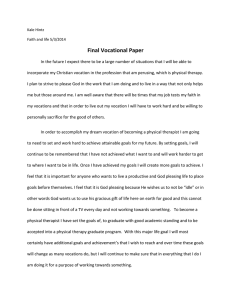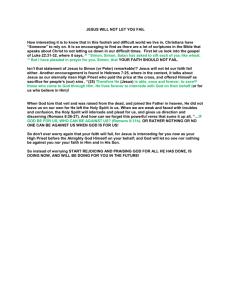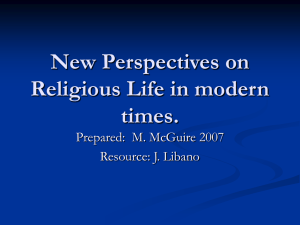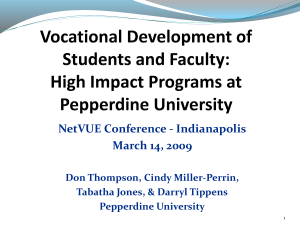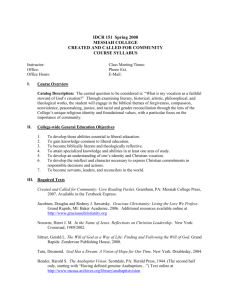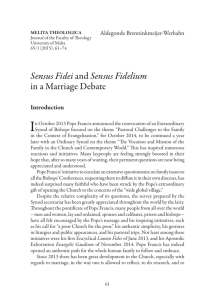Telling our faith story
advertisement
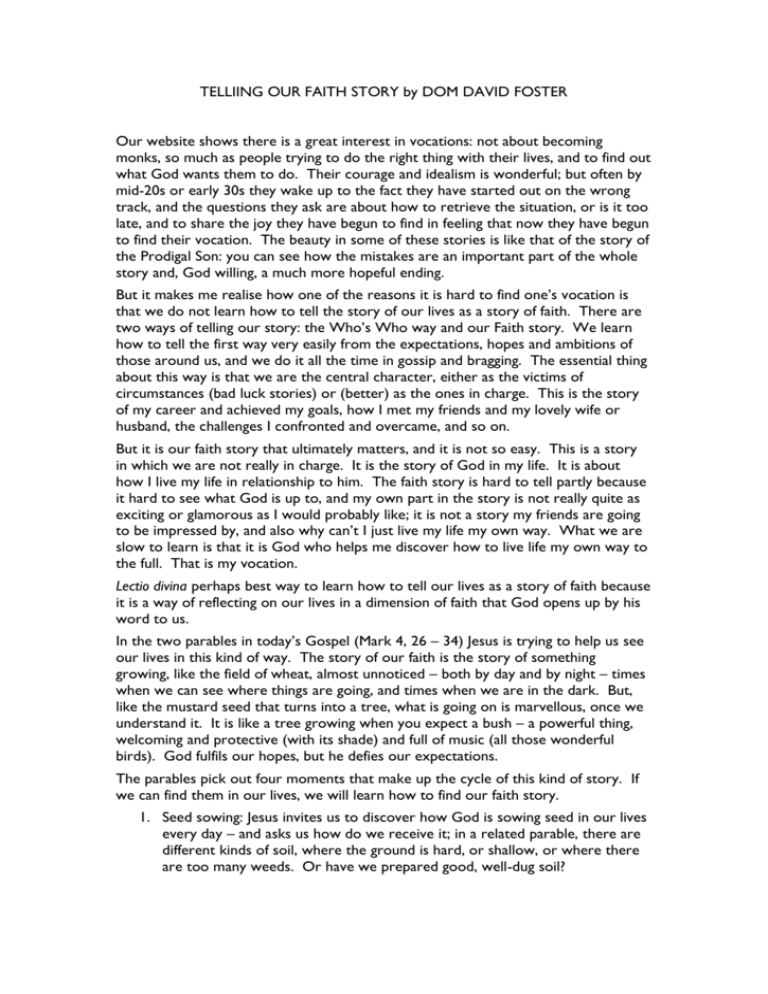
TELLIING OUR FAITH STORY by DOM DAVID FOSTER Our website shows there is a great interest in vocations: not about becoming monks, so much as people trying to do the right thing with their lives, and to find out what God wants them to do. Their courage and idealism is wonderful; but often by mid-20s or early 30s they wake up to the fact they have started out on the wrong track, and the questions they ask are about how to retrieve the situation, or is it too late, and to share the joy they have begun to find in feeling that now they have begun to find their vocation. The beauty in some of these stories is like that of the story of the Prodigal Son: you can see how the mistakes are an important part of the whole story and, God willing, a much more hopeful ending. But it makes me realise how one of the reasons it is hard to find one’s vocation is that we do not learn how to tell the story of our lives as a story of faith. There are two ways of telling our story: the Who’s Who way and our Faith story. We learn how to tell the first way very easily from the expectations, hopes and ambitions of those around us, and we do it all the time in gossip and bragging. The essential thing about this way is that we are the central character, either as the victims of circumstances (bad luck stories) or (better) as the ones in charge. This is the story of my career and achieved my goals, how I met my friends and my lovely wife or husband, the challenges I confronted and overcame, and so on. But it is our faith story that ultimately matters, and it is not so easy. This is a story in which we are not really in charge. It is the story of God in my life. It is about how I live my life in relationship to him. The faith story is hard to tell partly because it hard to see what God is up to, and my own part in the story is not really quite as exciting or glamorous as I would probably like; it is not a story my friends are going to be impressed by, and also why can’t I just live my life my own way. What we are slow to learn is that it is God who helps me discover how to live life my own way to the full. That is my vocation. Lectio divina perhaps best way to learn how to tell our lives as a story of faith because it is a way of reflecting on our lives in a dimension of faith that God opens up by his word to us. In the two parables in today’s Gospel (Mark 4, 26 – 34) Jesus is trying to help us see our lives in this kind of way. The story of our faith is the story of something growing, like the field of wheat, almost unnoticed – both by day and by night – times when we can see where things are going, and times when we are in the dark. But, like the mustard seed that turns into a tree, what is going on is marvellous, once we understand it. It is like a tree growing when you expect a bush – a powerful thing, welcoming and protective (with its shade) and full of music (all those wonderful birds). God fulfils our hopes, but he defies our expectations. The parables pick out four moments that make up the cycle of this kind of story. If we can find them in our lives, we will learn how to find our faith story. 1. Seed sowing: Jesus invites us to discover how God is sowing seed in our lives every day – and asks us how do we receive it; in a related parable, there are different kinds of soil, where the ground is hard, or shallow, or where there are too many weeds. Or have we prepared good, well-dug soil? 2. Growth of seed: farming involves quite a lot of hard work, but the point Jesus makes is that God gives the growth. All we can do is to prepare the ground, and care for what is going on in our lives. But we have to let it do its own growing: we are not ultimately in control. We are always working in conjunction and in response to God. 3. Harvest is enjoying the fruit of our labour, but it is also a time for thanksgiving for what God has done, and for taking stock for next year’s season. There are times of weeding and pruning too. For me this helps me think about the times of decision that do crop up in my life – and we need to be ready for them – times where we have to discern between good and bad, between right and wrong, and when we need wisdom and courage to do the right thing. But we must not forget the times for thanksgiving. 4. The second parable focuses on the sense of surprise and wonder. This is central to our discovery of the Kingdom of God, which is what Jesus is trying to talk about in his parables. If we live faithfully, in heaven we will be able to rejoice at lives whose meaning is often obscure in this world; we will be able to understand what was really going on. But Jesus is inviting us to discover the Kingdom of Heaven in this world, too. He is inviting us to look at our lives and our world in a way that is open to the kind of surprises and wonder that fill the parables. And he is also inviting us to celebrate the presence and power of his Kingdom in the midst of our community of faith through the Eucharist he shares with his disciples. We have all got our faith story. I hope that we will learn to tell it to each other so that we can find encouragement and wisdom in living our lives to the full. That will be to have found our vocation, and the source of our true and lasting happiness. People often talk about a crisis in vocations. But the crisis is not a shortage of vocations. The question is whether we will each be able to live our vocation out to the full. May it be so for each of us. Amen. Downside Abbey 18th June 2006 Ordinary Sunday of the Year 11(B)


